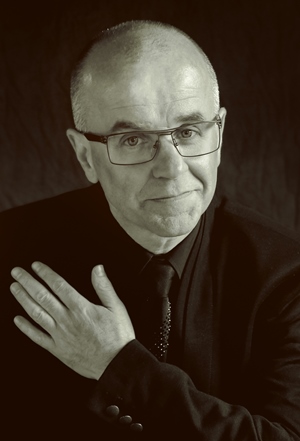Bell, Grant Park Chorus bring wide-ranging program to west side

The Columbus Park Refectory on Chicago’s far west side proved to be a unique but fitting performance space for the Grant Park Chorus, led by Christopher Bell, in an a cappella concert, “Songs of Praise and Passion.” People crowded the concert space, deck and patio to enjoy an evening of diverse and powerful choral music.
Contemporary a cappella choral music, which made up most of the program, occupies a unique niche of classical music. The repertoire is comprised primarily of less well-known composers, and Thursday evening’s lineup exemplified and exulted in that fact.
The choir introduced themselves with Sir Charles Hubert Parry’s My Soul, There is a Country. The energetic piece showed off the choir’s great command of dynamics, precise cut-offs, and their passion.
The next three compositions were composed by one of Lithuania’s leading choral composers, Vytautas Miskinis. His unique harmonic language of large, expressive chords highlighted the many colors of the Grant Park Chorus and their command of balance. The most powerful of the three, a setting of O Sacrum Convivium, epitomized the profound power of the collective human voice. The Grant Park Chorus sang the piece with conviction and near-perfect intonation, highlighting the consonances and dissonances within each multilayered chord.
The first piece, Dum medium silentium, featured complex, fragmented rhythmic figures juxtaposed to large, shape-shifting color-chords. Pater Noster was the composer’s imaginative setting of the Lord’s Prayer that was at times a profound meditation and at others a grant proclamation, ending in a haunting, whispered Amen.
Bell, director of the Grant Park Chorus, expressed his deep love for the inspired text setting of the next piece, Alleluia, Christus Resurrexit by English composer, Colin Mawby. The chorus never lost intonation through the rapidly swooping dissonances and dynamic contrasts.
The following pieces were selections from Rachmaninoff’s choral masterpiece, the All-Night Vigil. The chosen selections were, Come, Let Us Worship, Rejoice, O Virgin Theotokos, and Glory to God in the Highest. Rachmaninoff requires a massive Russian sound and the Grant Park Chorus provided it. Bell led the choir with a liberal approach to the dynamics while never losing them or the music. Energetic voice leading, bass-up balance, and grandiose climaxes made for a moving performance.
In contrast to Rachmaninoff’s serious, meditative pieces, the following two compositions were love songs by leading Estonian choral composer, Veljo Tormis. He set the poetry of fellow Estonian, Ernst Enno.
Both love songs were considerably contrasted. The first, Early Summer’s Fairy Tale, is light-hearted and innocent in nature and was dedicated to Enno’s former girlfriend. The Grant Park Chorus performed it with sensitivity and humor. The second, Soundlessly Somewhere Murmurings Homeward, was a much more seasoned look at love, dedicated to Enno’s wife of many years. A conversation was created by having the women chorus members in one key and the men in another with a constant sense of murmuring. The difficult work was executed very well.
The following three pieces were by Chicago composer, Stacy Garrop. She adapted the texts for Sonnets of Desire, Longing and Whimsy from American poet, Edna St. Vincent Millay.
The first, “Now By This Moon, Before This Moon Shall Wane,” examined love from the aspect of unreasonable desire. Garrop held nothing back in this crazed setting making use of sharp verbal consonances and exhales. The second, “Time Does Not Bring Relief,” was a haunting and twisted composition representing inconsolable longing. The third, “I Shall Forget You Presently, My Dear,” described a shallow, whimsical romance. The Grant Park Chorus performed these pieces with great confidence and close attention to the text.
The program concluded with a simple and moving piece by Steven Sametz, I Have Had Singing. The text rejoiced in a life made joyful through singing, and proved a fitting end to a wide-ranging and enjoyable evening.
Posted in Performances




